Children are explorers. Curiosity often leads them to peek 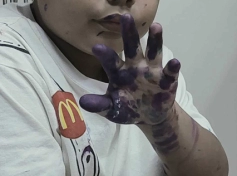 inside the doorknob's key hole; enthralls them to touch a squealing kettle; and ferry their feet into places where they are not allowed to be. Often, boundaries are broken.
inside the doorknob's key hole; enthralls them to touch a squealing kettle; and ferry their feet into places where they are not allowed to be. Often, boundaries are broken.
Children are expressive. Emotions often steer their ship as they navigate their social world. They jump, giggle, grin, and laugh when happy. A frown, a downturned face, and a shoulder-drop paint their sadness. Talking back, kicking the wall, shutting down, spitting, throwing things, and crying are the easiest cards to pull out when they are angry. Often, adults' patience is challenged.
Children, most of the time, do not listen, nor take heed of instructions and reminders; they have a loose grip of morality that even memory verses fall short of reminding them to be good. But this does not mean we stop teaching them to be kind. This is to remind us that children are fallible and that they do not have the skill sets to fully self-manage; even adults have difficulty regulating themselves, too. And children who misbehave a lot are often painted with a different color palette, viewed as a problematic child.
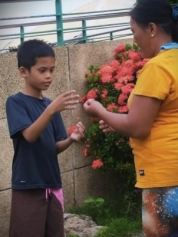 At CSC, children do not only go through these developmental obstacles. They are also bringing with them their adverse experiences. For some children, this baggage magnifies their difficulty to self-regulate. Without a proper lens, dealing with these children might be quite challenging. As adults, the common response is to control these behaviors but with the aid of Trauma Informed Care, houseparents, caregivers, and other staff have a better understanding of the underlying factors of such behaviors. Rather than seeking control, comfort is offered. Rather than spending time preaching the rules and whatnots, cultivating a relationship is the focus. Rather than seeing the child as problematic, the child is seen as a work in progress, still growing to reach his/her full potential, and to give the child a chance to lead a more meaningful life. Through Trauma Informed Care, we are always reminded with how Khalil Gibran viewed how children should be guided. In his poem, he said:
At CSC, children do not only go through these developmental obstacles. They are also bringing with them their adverse experiences. For some children, this baggage magnifies their difficulty to self-regulate. Without a proper lens, dealing with these children might be quite challenging. As adults, the common response is to control these behaviors but with the aid of Trauma Informed Care, houseparents, caregivers, and other staff have a better understanding of the underlying factors of such behaviors. Rather than seeking control, comfort is offered. Rather than spending time preaching the rules and whatnots, cultivating a relationship is the focus. Rather than seeing the child as problematic, the child is seen as a work in progress, still growing to reach his/her full potential, and to give the child a chance to lead a more meaningful life. Through Trauma Informed Care, we are always reminded with how Khalil Gibran viewed how children should be guided. In his poem, he said:
"...You may give them your love but not your thoughts,
For they have their own thoughts.
You may house their bodies but not their souls,
For their souls dwell in the house of tomorrow, which you cannot visit, not even in your dreams.
You may strive to be like them, but seek not to make them like you.
For life goes not backward nor tarries with yesterday.
You are the bows from which your children as living arrows are sent forth.
The archer sees the mark upon the path of the infinite, and He bends you with His might that His arrows may go swift and far.
Let your bending in the archer's hand be for gladness;
For even as He loves the arrow that flies, so He loves also the bow that is stable."
Khalil Gibran, excerpt from On Children
Starting with the Right Mindset
How do you get in the right mindset when you take on a task? Teacher Cora’s class knows what to do. When the students return to class after lunch they start with singing praises to the Lord.
Take some time before you start your next task to start with the right mindset. Praise the Lord!
English Language Learners
The students at the Children of Hope School always amaze me. Primary instruction is given in English, a second language for them. Learning a second language is not easy. The English language is one of the most difficult languages to learn because of the multiple pronunciations for words, rules, and many exceptions to the rules. I admire these students for their perseverance and courage in the classroom as they learn English.
In our class, we have a morning routine. We gather our
materials, pray, say “Good morning!” to one another, occasionally do a few
stretches to calm our bodies down for class (including one of their favorite
stretches called “warrior pose”), and do an activity that focuses on developing
the students’ oral language in English. As a teacher, I will often give a word
and ask one of the students to use this word in a sentence. Just the other day,
we were doing this activity, and I asked the class if anyone could use the word
“oppose” in a sentence. One student (pictured below) raised his hand with
confidence. He was sure that his sentence would be correct. With excitement in his voice, he said, “I do a
warrior pose!” He had heard “a pose” instead of the word “oppose”. It was a funny moment that allowed for
further learning. By the time I asked the students to use a different word in a
sentence, his hand was raised with just as much excitement. He does not give up when he makes a mistake; he faces each new challenge with enthusiasm. 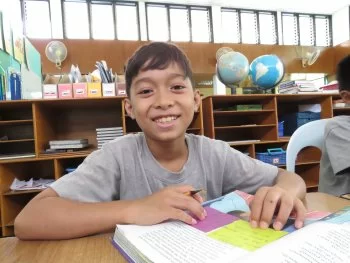
Responsibility
- I will keep my promises.
- I will not make excuses.
- I will do all my work to the best of my ability.
- I will make things right when I do wrong.
- I will know my duty and do my duty.
(Character First! Education Series 2, booklet 1)
The statements mentioned above are not early New Year resolutions. They are some helpful tips students have been learning in order to form responsible habits.
The question is: what is responsibility? Responsibility means knowing and doing what is expected of me. (Character First! Education Series 2, booklet 1)
Wow! Sounds simple and easy, right? That’s what the Group 4 Bible Class students thought at first, but they soon realized the words “easier said than done” are quite true. Amazing! As their teacher, I never expected those words would come from my young students.
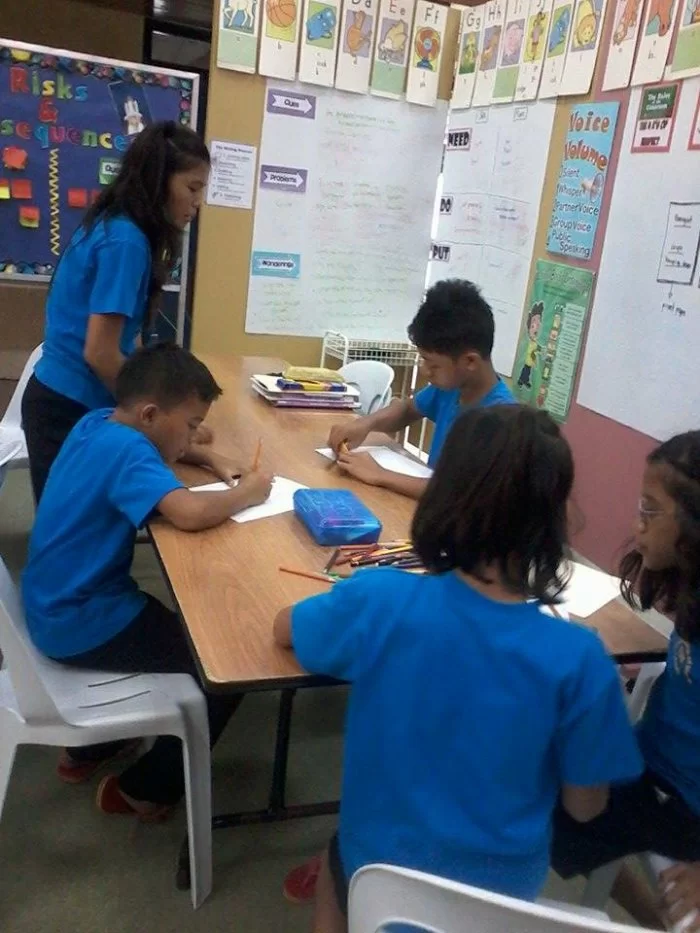 Great
realization kids! Keep it up!
Great
realization kids! Keep it up!
New Friends
Friends are great! It is wonderful to know that someone is excited to see you and spend time with you. You can share stories, ideas, laughter, and so much more.
Within the past two weeks, six new children of arrived at shelter. They are excited to be here, but also a little apprehensive about the who will be their friends. Luckily for them, all the other children know exactly what it is like to be the new kid.
The older girls in Cherne home were having a hard time waiting for their new housemate to come out of isolation. She had a cough and needed to wait a couple days. The girls would sit on the stairs to the infirmary and get to know the new girl.
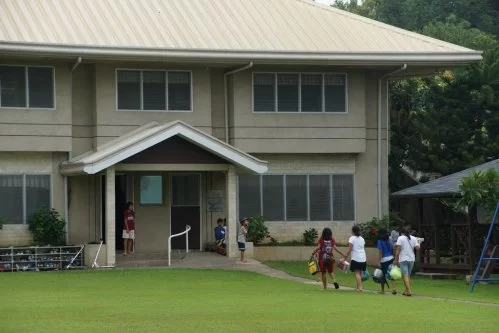 When she
finally was given the all clear to join the home, she was accompanied by her
new friends to her new home.
When she
finally was given the all clear to join the home, she was accompanied by her
new friends to her new home.
Sometime adults worry about how younger children will get along with each other. One of the new boys has an older sister. She is in school all day and he is preschool so he is only in school for a couple hours. Will he be all right without his sister by his side all afternoon?
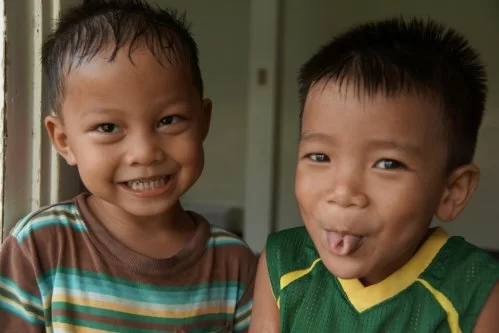 With the
help of his new friend on the left, there are no worries.
With the
help of his new friend on the left, there are no worries.
The adults of CSC show love to the children and teach them trust. Sometimes the adults forget just how much the children can do for each other. The love and care for fellow children just as important.
Pray the children will continue to share love with their fellow children. Pray the new children will settle in and make friends. Pray all the children will be able to feel God’s love for them—whether it is from an auntie or uncle or fellow child.
Bisan Saging, Basta Loving
Most Cebuanos my age grew up with a saying that goes “Bisan saging, basta loving.” This saying means that even when the family is eating bananas all the time, as long as they love each other, the family is okay.
The passage, Proverbs 15:17, “Better a meal of vegetables where there is love than a fattened calf with hatred” reminds me of that old saying. It also reflects on the situations CSC’s children came from. Not the whole, but the part about bananas and hatred. The kids at CSC have come from different situations of poverty, neglect, abuse, and abandonment. Some of the kids came from loving situations that deteriorated because one parent died suddenly. The one parent left behind could not cope up with trying to earn a living while taking care of the children at the same time. Some of the kids came from broken families. Most of them were abused before being cast aside when a parent got involved in a new relationship.
Bisan saging basta loving. Better a meal of vegetables where there is love than a fattened calf with hatred. Some of these children did not have anything at all, no bananas, no vegetables, no fattened calf, no one to turn to, and most of all, no love, but had an abundance of hatred at times.
Kindness, understanding, patience, hope, faith, joy, grace, and most of all, love. This brings to mind that this is what CSC is all about. It is not because of the beautifully maintained houses, medical building, and school, nor the playground and other things, though all of these have helped. But, it is the people that made the shelter what it is. Feelings of warmth and welcome are created by people who are kind, generous, patient, hopeful, understanding, even-tempered, and most of all, loving. Different backgrounds, educated to the less educated, Americans and Filipinos, people who answered God’s call to pray, give generously, volunteer their time during mailings, and serve on the CSC Boards both here in Cebu and in the US. They came together to serve in a ministry that not only provided a roof over the heads of these children, but the loving-kindness and the grace of God that the children had not experienced before.
At CSC, there is no “bisan saging basta loving,” and “no better a meal of vegetables where there is love than a fattened calf with hatred.” CSC is a big home, a big family that God has blessed with His love and grace. Thank you Lord for the people who answered Your call to serve in this ministry.






